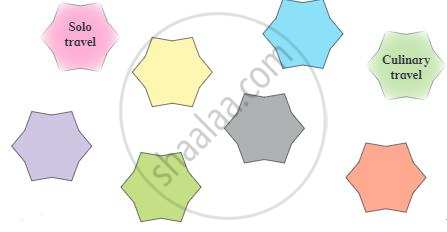Advertisements
Advertisements
Question
Prepare a list of the litterateurs and their quotations mentioned by the writer in the passage.
Solution
- Name of the litterateur: George Santayana.
Quotation: George Santayana writes, "We need sometimes to escape into open solitudes, into aimlessness, into the moral holiday of running some pure hazard, in order to sharpen the edge of life, to taste hardship, and to be compelled to work desperately for a moment at no matter what." - Name of the litterateur: Oliver Cromwell
Quotation: "A man never goes so far as when he doesn't know where he is going." - Names of the litterateurs: Camus, Christopher Isherwood
Quotations: Camus said, "What gives value to travel is fear".
Christopher Isherwood once said, "The ideal travel book should be perhaps a little like a crime story in which you're in search of something." - Names of the litterateurs: Sir John Mandeville, Emerson, Thoreau and Sir Thomas Browne.
Quotations: Emerson said, "Travelling is a fool's paradise."
Thoreau said, "I have travelled a good deal in Concord.
“Sir Thomas Browne sagely put it, "We carry within us the wonders we seek without us. There is Africa and her prodigies in us." - Names of the litterateurs: Peter Mathieson, Oliver Sacks, George Santayana
Quotation: George Santayana wrote, "There is wisdom in turning as often as possible from the familiar to the unfamiliar; it keeps the mind nimble; it kills prejudice, and it fosters humour.”
APPEARS IN
RELATED QUESTIONS
Share your views on how travelling can be a hobby.
Discuss in the class the benefits of travelling and complete the web.

Make a list of your expectations when you travel to some new place:
- Food should be delicious and available whenever hungry
- ___________________
- ___________________
- ___________________
Discuss in the class the various types of travels. Add your own to ones given below:

Read the first two paragraphs and discuss the need to travel.
Read the sentence ‘If a diploma can famously ________ in cultural relativism.’
Pick the sentence which gives the meaning of the above statement from the alternatives given below.
- A diploma certificate can be used as a passport and a passport can be used as a diploma certificate.
- If one has a diploma, he does not need a passport and if he has a passport, he does not need a diploma.
- One can acquire permission to travel to foreign countries for educational purposes based on her academic achievements and travelling to foreign countries enriches one the most regarding the knowledge and wisdom of the world.
‘The real voyage of discovery consists not in seeing new places but in seeing with new eyes.’ Marcel Proust. Justify with the help of the text.
Read the third paragraph and find the difference between a tourist and a traveller as revealed through the complaints made by them.
Write four sentences with the help of the text conveying the fact that travelling brings together the various cultures of the different parts of the world.
By quoting Camus, the writer has stated that travelling sets us free from circumstances and all the habits behind which we hide. Write in detail your views about that.
Read the following groups of words from the text.
| A | B |
| crooked angle | walking video screens |
| censored limits | living newspapers |
| impoverished places | searching questions |
Words crooked, censored and impoverished in group ‘A’ describe the nouns ‘angle’, ‘limits’ and ‘places’ respectively. They are past participles of the verbs ‘crook’, ‘censor’ and ‘impoverish’. But in the sentences, they act as adjectives. Similarly, in group ‘B’ wordswalking, living and searching are the present participles (‘ing’ forms) of the verbs walk, live and search. But in the above examples they function as adjectives.
Discuss in pairs and make list of some more adjectives like this and make sentences using them.
There is boom in ‘Travel and Tourism’ career. Find information about different options in this field.
Find information about Fa Hien.
Find information about Huen Tsang.
Find information about Ibn Batuta.
Find information about Marco Polo
Find information about Sir Richard Burton.
Further reading:
‘Childe Harold’s Pilgrimage’ – Lord Byron
Further reading:
‘Gulliver’s Travels’ – Jonathan Swift
Further reading:
‘Twenty Thousand Leagues Under The Sea’ – Jules Verne
Further reading:
‘Travelling Souls’ – Brian Bouldrey
